Last argument for terrorists
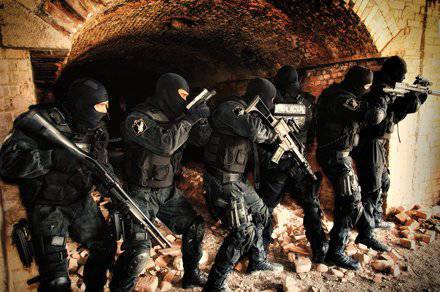
The seventies of the last century became the turning point that forced many states to create their own special-purpose units. The impetus for this, as we have repeatedly written, were the events at the Munich Olympiad 1972, when Arab terrorists took hostage athletes of the Israeli national team. As a result of an unsuccessful assault conducted by German police, 9 Olympians died. The actions of law enforcement officers were deemed unprofessional. This was largely due to the lack of specialized units capable of adequately responding to terrorist manifestations.
There was no exception and Portugal, whose police by then did not have sufficient operational capabilities to counter such threats. There were also legal difficulties, since according to the Portuguese constitution, the police were forbidden to act strictly on the territory of the country with the exception of crisis situations or martial law. However, the attack pushed the Portuguese authorities to reconsider their approaches to solving such problems. In 1977, a special study was conducted, the findings of which formed the basis for a special order to create an anti-terrorism unit. The newly created group became known as the Grupo de Operacoes Especiais, abbreviated GOE, and became part of the public security police. Colonel Oliveira Marquez was appointed her first commander.
Since the beginning of 1978, work has been launched to create the necessary infrastructure to house the future employees of the group and to organize their training in the town of Quinta das aguas Leavresh. At the same time, thanks to the government of Carlos Mota Pinto, an agreement was concluded with the British authorities to assist in the training of the new police special forces. To this end, Great Britain sent the most experienced instructors of the 22 regiment of the special airborne CAC service to Portugal, who began training their southern colleagues. Just a year later, GOE gained confidence in its abilities and soon earned the fame of one of the best counter-terrorism units in the world.
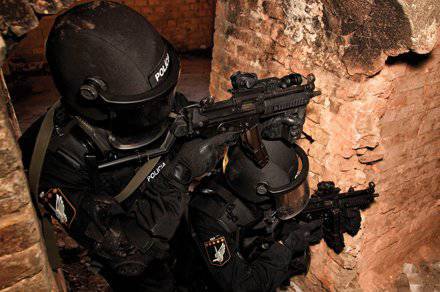
The first training course began on March 29 of the year 1982, and it ended on November 18 of the same year, after which the unit, in essence, was ready for operations of the intervention.
After talking with the SAS fighters, the Portuguese special forces continued their interaction with their foreign counterparts - soon strong contacts were established with the American Delta group, the German GSG-9, the counter-terrorism units of Israel and the Spanish civil guard.
The first special operation was carried out by Portuguese special forces 27 on July 1983, when five members of the so-called “Armenian Revolutionary Army” attacked the Turkish Embassy in Portugal. The terrorists broke into the embassy in a rented car, killed a police officer guarding the diplomatic mission, and took part of the hostage. A large police force, including the GOE group, was pulled to the scene of the terrorist attack. However, just a few minutes before the start of the assault, an improvised explosive device exploded as a result of the error of one of the attackers. Four terrorists died on the spot, the ambassador’s wife was injured.
With the collapse of the Warsaw Pact and the fall of the Berlin Wall, tremendous changes have taken place in the world, which have led to significant changes in the nature of terrorist activities. Today, the situation looks in such a way that the threats of terrorism are difficult to predict, and the actions of the terrorists themselves are extremely cruel and sometimes even barbaric illogical.
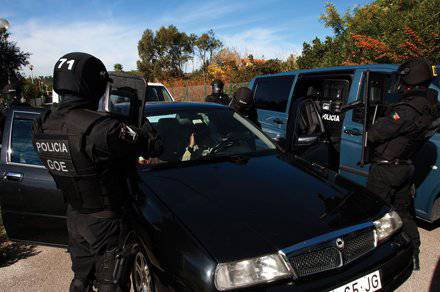
Since the formation of the group, the tasks that faced it at the initial stage have undergone significant changes. They have become more diverse, and the demands that the police leadership makes to the unit have intensified. Since 1991, the GOE, in addition to performing operational functions proper, has begun to guard Portuguese diplomatic missions in foreign countries, especially where an unstable situation has developed or an armed conflict has been blazing. At the same time, the level of participation of the GOE special forces in such missions depends on the specific situation.
In addition, employees of the group are actively attracted to ensure the safety of Portuguese citizens abroad. So, they participated in the evacuation of Portuguese nationals in 1992, in Luanda (Angola), in 1991 and 1997 in the Democratic Republic of the Congo (formerly Zaire), as well as in other countries: in Guinea-Bissau, Algeria, Macau, Bosnia and more recently in Egypt. In a number of cases, they had to face attempts to force armed militants into the diplomatic missions. The most serious situation was in 1997, in Zaire, and in 1998, in Guinea (in this country, during the riots, the rebels even fired at the embassy, which was guarded by a special forces group, from a grenade launcher). In 2005, GOE employees were sent to Saudi Arabia and Iraq to protect the Portuguese embassy and the staff there.
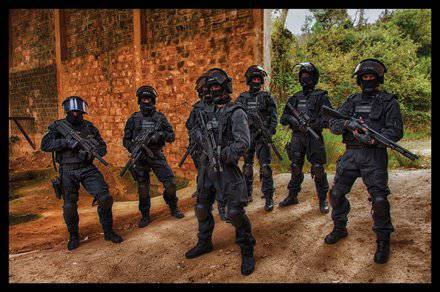
An important element of the functional responsibilities of the staff of the group is to provide security for VIPs on official visits to Portugal. In this issue, special forces have to actively interact with other police units.
Another GOE activity is cooperation with crime prevention teams, with which the group provides assistance in combating drug trafficking. Since 2006, the GOE team, together with the country's famous special police unit, the intervention team CI (Corpo de Intervencao), ensures the security of the Portuguese embassies in Iraq and East Timor.
In August 2008, the GOE special forces took part in a special operation to neutralize the criminals who committed robbery in Campolide, the Lisbon branch of the Portuguese bank BES, and took six hostages there. Two armed raiders turned out to be illegal migrants from Brazil. As a result of the lightning-fast actions of the special forces, one of the robbers was killed on the spot by a sniper shot (a bullet hit him right in the heart), the other was wounded in the jaw. All the hostages were released, four of them shortly after the start of negotiations, and the remaining two after the end of the operation and the neutralization of the raiders. The actions of the Portuguese Special Forces were recognized by the authorities and society as highly professional and timely.
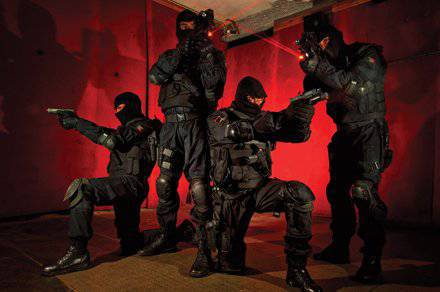
From the middle of 1990, the GOE group was also entrusted with the task of combating violent, especially dangerous forms of crime. In this context, the special forces began to work, actively interacting with colleagues involved in the fight against crime, such as the regiment of the public security police, judicial police units, etc. As a rule, members of the group are involved in apprehending suspects (often armed) with dangerous violent crimes. And in this situation, special forces usually act tough and decisive.
GOE differs from other divisions in that it closes the power component of counter-terrorism activities and has the right to operate throughout the country. The range of tasks solved in this area by Portuguese special forces is extremely wide. Moreover, the group has great potential in this regard. Employees of GOE are specially trained for special counter-terrorism activities on airplanes, public transport (trains, subway lines, buses, cars), in the city or in rural areas, at various industrial facilities, etc.
In parallel with a group of special operations, in connection with the sharp increase in criminal activity in the Sintra region near Lisbon, new special police units began to form for operations in the region. Thus, a special unit Equipas de Reaccao Tactica (ERT) was created to conduct tactical activities, which consisted of no more than 10 employees. They were supposed to be assigned to patrol duties in the Amadora area. The Equipas de Racao Taticas Encobertas group (ERTE) has become another similar special unit designed to carry out covert operations. Its task was to fight organized crime, especially in cases where the public security police forces were unable to carry them out.
In accordance with the decision of the Ministry of the Interior in August 2007, the public security police were reorganized, which consisted in the formation of its new territorial structure. Significant news at the same time, the creation of the special police unit Unidade Especial de Policia (UE) was created, and the structure of the American SWAT team was taken as the basis.
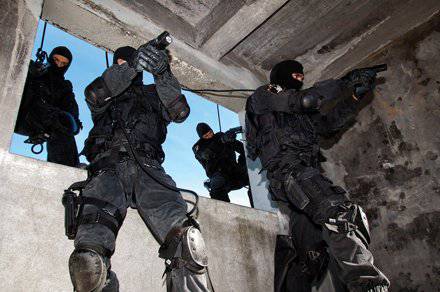
The new formation included various police special forces already in force by that moment, namely:
-? Group of special operations - Grupo de Operacoes Especiais (GOE),
-? Team intervention - Corpo de Intervencao (CI);
-? Personal security team - Corpo de Seguranca Pessoal (CSP);
-? Engineering center - Centro de Inactivacao de Explosivos e Seguranca em Subsolo (CIEXSS);
-? Technical operational group - Grupo Operacional Cinotecnico (GOC).
Thus, the total number of employees of all units included in the new association was about 2000 people. Such a structure, when police forces of various specializations are concentrated under a single command, is very effective in solving various and complex tasks. These include ensuring public order, carrying out special-risk operations of tactical intervention, protecting objects, factories and large events, ensuring the personal safety of politicians and VIPs, detecting and neutralizing explosives and explosive devices, participating in international peacekeeping missions, etc.
Organization and tasks
The headquarters of the group is located in Quinta das agua Libresh, near Lisbon. The size of the group is about 200 employees, divided into categories for officers, non-commissioned officers and ordinary police officers. The group is directly subordinate to the director of the public security police, but is organizationally included in the structure of the special police association.
Interestingly, the group retained the original organizational structure that was established 30 years ago. Since its inception, it included three teams, two of which were operational, and the third included the sniper and training sections. Later, four teams were already formed in the group: two operational ones to perform special tasks, the third included sniper and technical sections, the fourth was responsible for training the personnel. In recent decades, the group continued to consist of four teams. At the same time, the first three 20 – 25 people in each were intended for conducting assault operations (or intervention operations, as they say in Europe). The fourth team was responsible for technical support and training of personnel. The latter team consists of four divisions: the negotiation section, the engineering section, the technical and surveillance section and the training section. The organizational structure of the group is extremely flexible, so that the command can always form mobile modular teams comprising highly skilled specialists, from operative and attack aircraft to bomb technology, sniper, driver and even medical instructor, to solve specific tasks both at home and abroad. These teams, relatively few, are able to act completely autonomously, having everything they need to complete their tasks. This feature gives the group the opportunity to take part in a variety of missions.
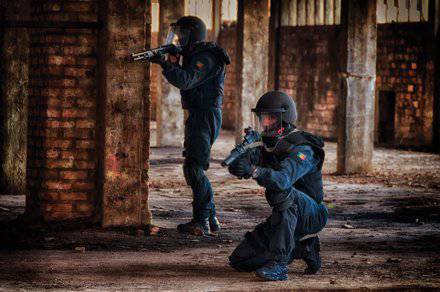
Prepare
The group very carefully approaches the initial selection of personnel, which passes a series of rigorous tests. In the course of subsequent training, instructors ensure that all special forces who come to the police achieve a single high level of professional training, without which it is impossible to succeed in carrying out dangerous and risky operations.
Selection and testing for admission to the group is carried out once every two years. Anyone who wants to become a GOE commando must be an active member of the Public Security Police, be in office for two years and have some experience in the service. Also in the group are those who serve in some elite units of the Portuguese commandos, ground forces and the naval fleet.
The group accepts volunteers only on a voluntary basis, while candidates must be completely healthy both physically and morally, and have a height above 170, see. Then follows a series of challenging tests that end with Cooper’s test, similar to Army Special Forces: running 100 meters in 14,5 seconds, 45 flexing the press in 2 minutes, swimming in the 25-meter pool. After that, everyone undergoes a physical examination and eventually proceed to psychophysical tests, during which the emotional profile of each candidate is determined. As a result, it is possible to select only one group of the best candidates of up to a hundred people.
The next stage of preparation is the weekly qualifying course, which consists of continuous physical exercise, endurance and determination tests, and other types of checks. During these seven days, applicants are constantly at the training base, practically do not sleep, are subjected to great physical and emotional pressure, which allows them to better determine their motivation. This is done in order to force the weaker candidates to abandon the idea of becoming a special task force (as a rule, at the end of the week, half of the original number remains in the group).
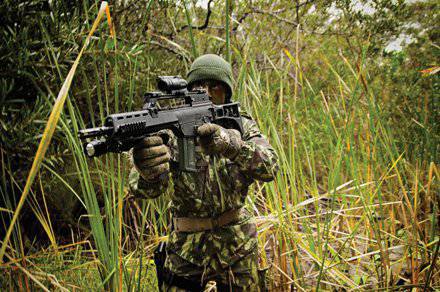
After this initial test, a small group of those who have passed the test are sent for further selection to the course of special operations. On average, it lasts 6 – 7 months, and as practice shows, only 5 – 10 percent of beginners pass it.
The course is divided into three stages, each of which has its own purpose. The first is focused on testing physical abilities and confirming the motivation of candidates. In addition, they gain advanced skills in working with firearms. weapons and shooting practice. At the second stage, a gradual study of tactical techniques and team actions begins, an assessment of the psychophysical capabilities for performing the assigned tasks is conducted. The third stage is focused on the study of specific methods and tactical techniques for conducting counter-terrorist operations of missions, and working out methods for neutralizing criminals at various sites. In addition, hand-to-hand fighting is conducted, actions on the water, in the mountains are practiced, explosives are studied, trainings on tactics and methods of movement, topography, shooting, including sniper, etc. are conducted.
After completing the course, the best candidates are accepted into the operational staff of the group, where they continue their further education and acquire new knowledge. Already in assault teams or in support sections, newcomers deepen their knowledge, practicing automatism of various ways of performing special operations, apprehending highly dangerous criminals, perfecting their shooting skills, for which they use so-called situational trainings. Naturally, the specificity of the group itself implies a thorough knowledge of the design of airplanes, buses, trains, multi-storey buildings - in short, those objects on which the special forces may have to act if an emergency situation arises.
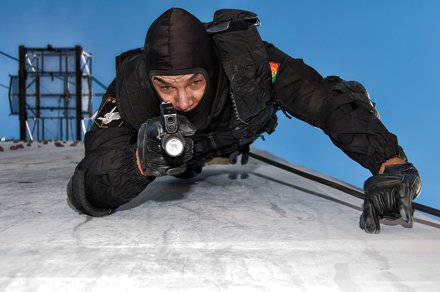
For example, we note that the high-altitude training of the staff of the intervention teams is conducted on towers up to 22 meters in height, which are installed on the basis of the unit. In addition, the closest cooperation established with the helicopter units of the Portuguese Air Force. Usually, special forces use the capabilities of rotary-wing machines, such as Puma AS-330 or NH-90, to practice skills of downhill descent to an object in special files.
In conclusion, we note that the group of special operations of the police of Portugal does not stop in its development and is constantly improving both its professional skills and material and technical equipment. What contributes to effectively confront terrorists and criminals.
Information